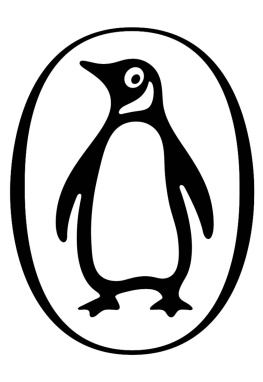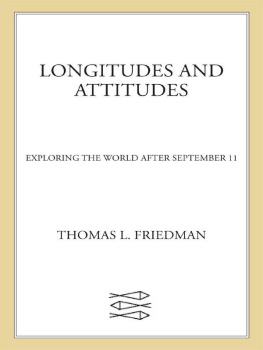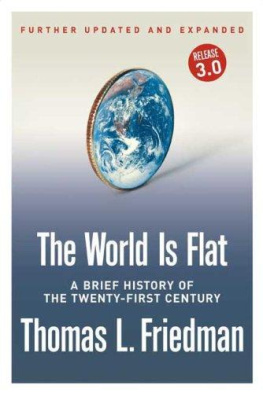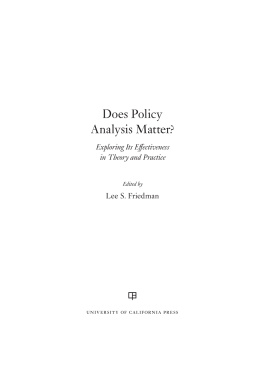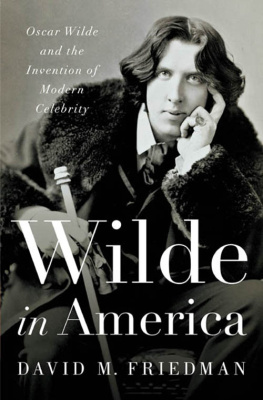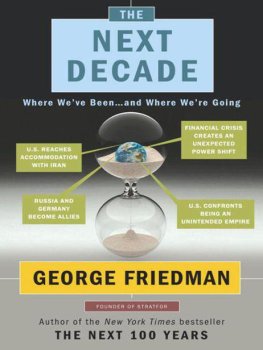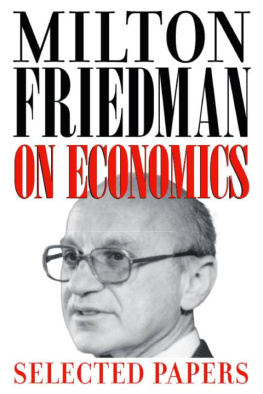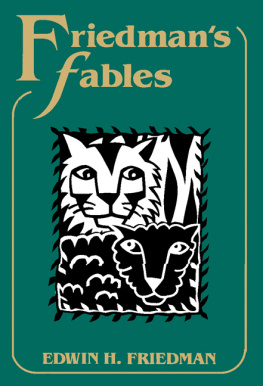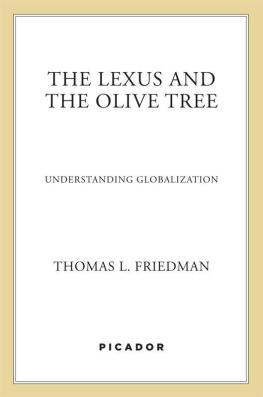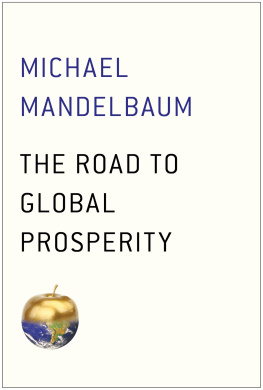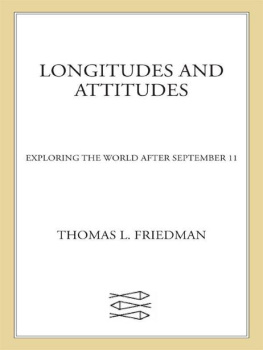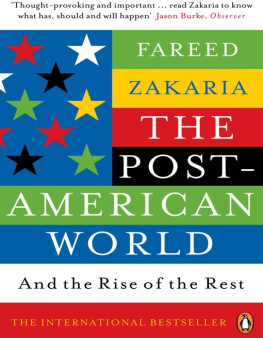PENGUIN BOOKS
HOT, FLAT, AND CROWDED
Friedmans voice is compelling and will be widely heard David Victor, The New York Times
Unlike so many books about the changing environment he hopes for the best its persuasiveness lies in the absence of hair-shirt rhetoric Ben Macintyre, The Times
America needs a forceful advocate like Friedman to make this case for change Richard Lambert, Guardian
Friedman is always worth reading In Hot, Flat, and Crowded he aims to reclaim greenness from the liberal, tree-hugging, sissy and unpatriotic ghetto into which it has been forced by critics, adopting instead a realistic and economically literate position Philip Stott, Sunday Telegraph
A compelling read The Times Educational Supplement
Lively, sympathetic Friedman has a gift for weaving anecdotes and examples from around the world into his broader tapestry will get people talking Chrystia Freeland, Financial Times
ABOUT THE AUTHOR
Thomas L. Friedman has been awarded the Pulitzer Prize three times for his work with The New York Times, where he serves as the foreign affairs columnist. Read by everyone from small-business owners to President Obama, Hot, Flat, and Crowded was an international bestseller. Friedman is also the author of From Beirut to Jerusalem (1989), which won both the National Book Award and the Overseas Press Club Award, The Lexus and the Olive Tree (1999), Longitudes and Attitudes (2002), and The World Is Flat (2005), which won the first Financial Times/Goldman Sachs Business Book of the Year Award. He lives in Bethesda, Maryland.
THOMAS L . FRIEDMAN
Hot, Flat, and Crowded
WHY THE WORLD NEEDS A GREEN
REVOLUTION AND HOW WE CAN
RENEW OUR GLOBAL FUTURE
RELEASE 2.0
UPDATED AND EXPANDED

PENGUIN BOOKS
PENGUIN BOOKS
Published by the Penguin Group
Penguin Books Ltd, 80 Strand, London WC2R 0RL , England
Penguin Group (USA) Inc., 375 Hudson Street, New York, New York 10014, USA
Penguin Group (Canada), 90 Eglinton Avenue East, Suite 700, Toronto, Ontario, Canada M4P 2Y3
(a division of Pearson Penguin Canada Inc.)
Penguin Ireland, 25 St Stephens Green, Dublin 2, Ireland (a division of Penguin Books Ltd)
Penguin Group (Australia), 250 Camberwell Road, Camberwell, Victoria 3124, Australia
(a division of Pearson Australia Group Pty Ltd)
Penguin Books India Pvt Ltd, 11 Community Centre, Panchsheel Park, New Delhi 110 017, India
Penguin Group (NZ), 67 Apollo Drive, Rosedale, North Shore 0632, New Zealand
(a division of Pearson New Zealand Ltd)
Penguin Books (South Africa) (Pty) Ltd, 24 Sturdee Avenue, Rosebank, Johannesburg 2196, South Africa
Penguin Books Ltd, Registered Offices: 80 Strand, London, WC2R 0RL , England
www.penguin.com
First published in the United States of America by Farrar, Straus and Giroux 2008
First published in Great Britain by Allen Lane 2008
Published in Penguin Books 2009
Copyright Thomas L. Friedman, 2009
The moral right of the author has been asserted
Graphs reproduced with permission from Foreign Policy, www.foreignpolicy.com, #154, May/June 2006.
Copyright 2006 by the Carnegie Endowment for International Peace.
All rights reserved
Without limiting the rights under copyright reserved above, no part of this publication may be reproduced, stored in or introduced into a retrieval system, or transmitted, in any form or by any means (electronic, mechanical, photocopying, recording or otherwise), without the prior written permission of both the copyright owner and the above publisher of this book
ISBN: 978-0-14-191850-1
ForAnn,again
Preface to the Release 2.0 Edition
Welcome to the Release 2.0 paperback edition of Hot, Flat, and Crowded. I have always viewed my books the way computer programmers view softwareas works in progress that should be updated whenever possible. Technology today makes that easier than ever to do, and so, as with my previous books, I have taken advantage of that opportunity here.
I want to thank the readers who took the time to share their thoughtful ideas and feedback on my Web site during the past year. The quality and scope of the comments enriched my understanding of the subject and helped me to think about how to push my arguments forward. My original plan to make readers comments part of a new , however, was overtaken by eventsparticularly the global financial crisis that emerged in full bloom just three weeks after this book was originally published in September 2008. I have substantially rewritten the first three chapters for this new edition to show how the crisis in the financial marketplace and the crisis in our natural world are actually rooted in the same kind of flawed accounting and thinking about risk. Elsewhere, I have used the past year to sharpen certain arguments, update facts, and, I hope, make an even more compelling case that the forces making our world hot, flat, and crowded pose the greatest challenge for our generation and that rising to that challenge could actually be our greatest economic opportunity. We cannot afford to miss either one.
Thomas L. Friedman
Bethesda, Maryland
September 2009
PART I
When the Market and Mother Nature Hit the Wall
ONE
Why Citibank, Icelands Banks, and the Ice Banks of Antarctica All Melted Down at the Same Time
O n June 15, 2005, as the global economy was booming, the satirical newspaper The Onion carried the following story about Chinese workers and all the stuff they make for Americans. Though a fake story, like many in The Onion it actually spoke some essential truths:
FENGHUA, CHINA Chen Hsien, an employee of Fenghua Ningbo Plastic Works Ltd., a plastics factory that manufactures lightweight household items for Western markets, expressed his disbelief Monday over the sheer amount of [crap] Americans will buy.
Often, when were assigned a new order for, say, salad shooters, I will say to myself, Theres no way that anyone will ever buy these, Chen said during his lunch break in an open-air courtyard. One month later, we will receive an order for the same product, but three times the quantity. How can anyone have a need for such useless [crap]?
Chen, 23, who has worked as an injection-mold operator at the factory since it opened in 1996, said he frequently asks himself these questions during his workweek, which exceeds 60 hours and earns him the equivalent of $21.
I hear that Americans can buy anything they want, and I believe it, judging from the things Ive made for them, Chen said. And I also hear that, when they no longer want an item, they simply throw it away. So wasteful and contemptible.
Among the items that Chen has helped create are plastic-bag dispensers, microwave omelet cookers, glow-in-the-dark page magnifiers, Christmas-themed file baskets, animal-shaped contact-lens cases, and adhesive-backed wall hooks.
Sometimes, an item the factory produces resembles nothing Ive ever seen, Chen said. One time, we made something that looked like a ladle, but it had holes in its cup and a handle that bent down 90 degrees. The foreman told us that it was a soda-can holder for an automobile. If you are lucky enough to own a car, sit back and enjoy the journey. Save the soda beverage for later.
Chen added: A cup holder is not a necessary thing to own.
Chen expressed similar confusion over the tens of thousands of pineapple corers, plastic eyeshades, toothpick dispensers, and dog pull-toys that he has helped manufacture.
Next page
